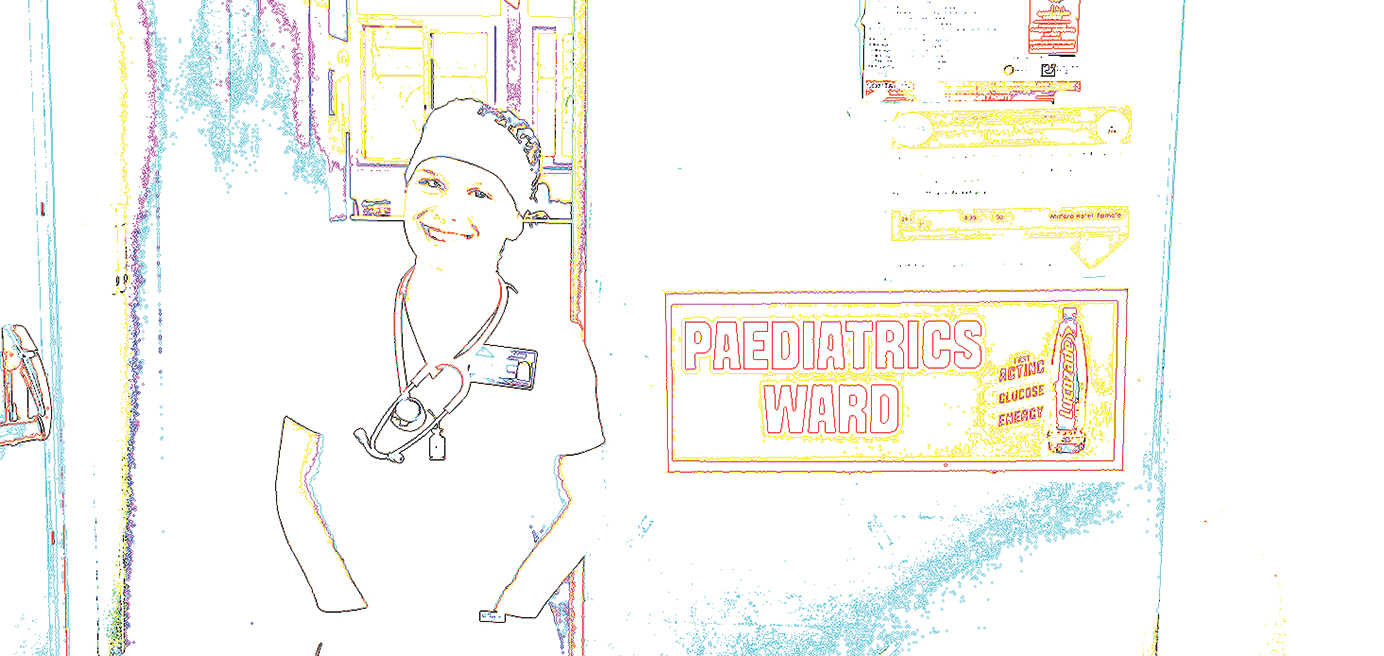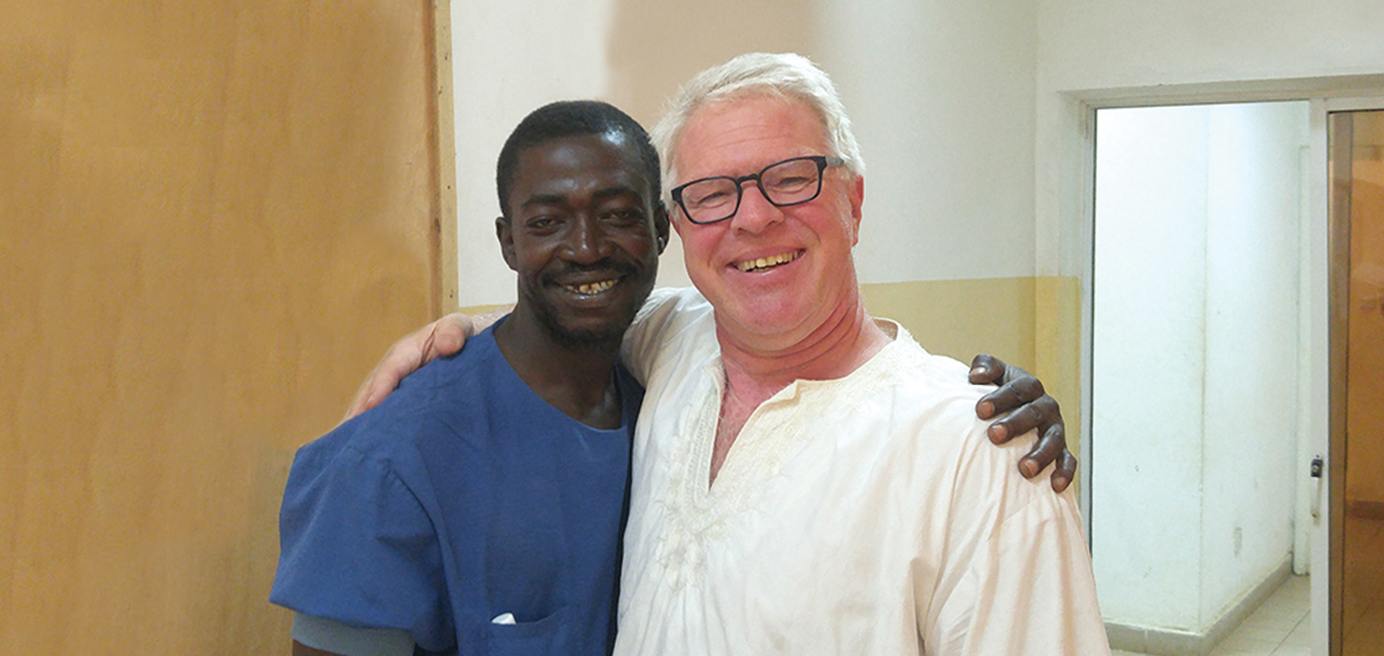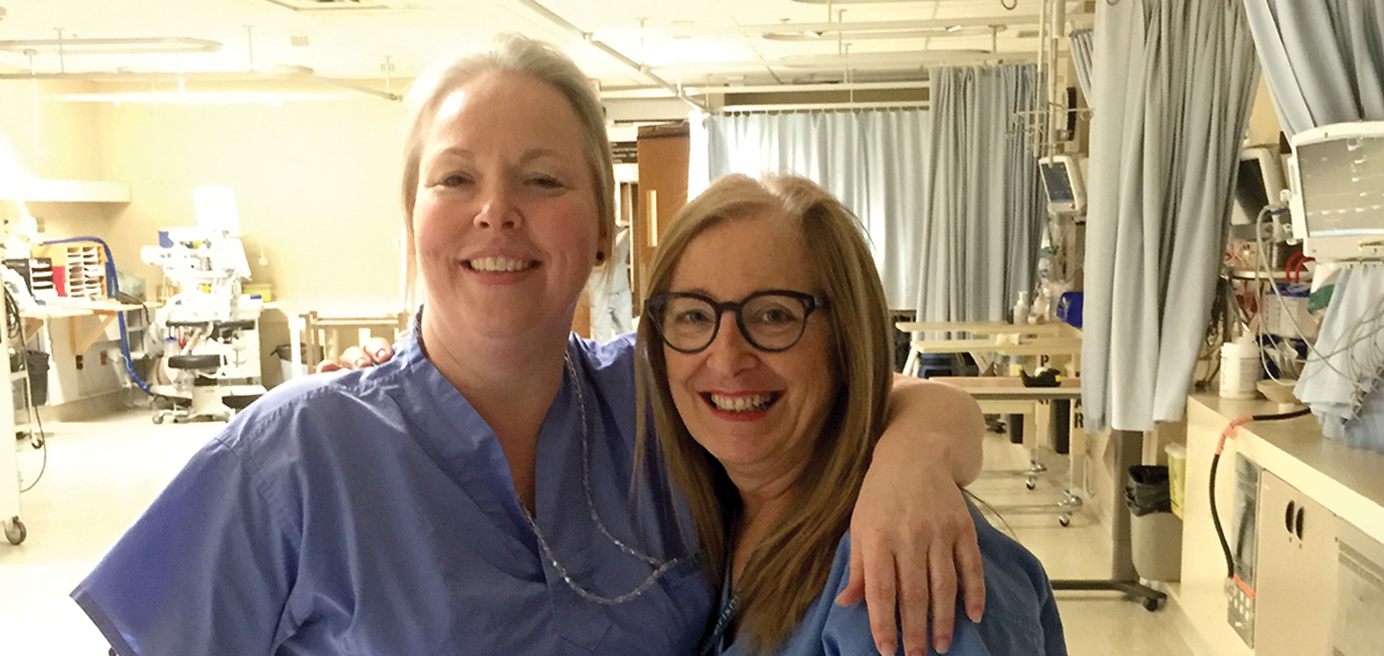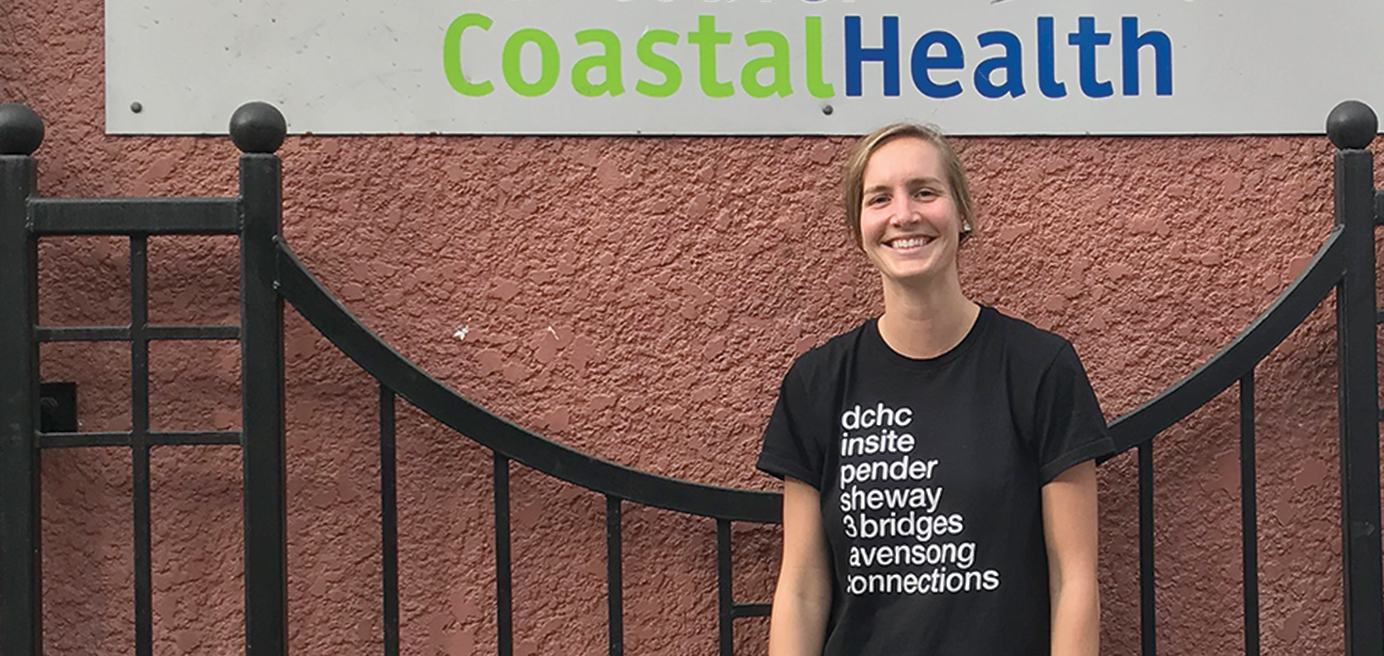 On a Mission
On a Mission

Opinion poll after opinion poll tells us that Canadians place a high value on their public health-care system.
Medicare is a source of national pride, and whatever challenges the system faces, most people agree that we should work to improve access to high-quality health care that's provided on the basis of need, and not wallet size.
Nurses also regularly top polls, and are ranked as the most trusted professional occupation. It goes to show the value and importance of nursing for all Canadians.
It can sometimes be easy to forget the importance of health care in a developed county like ours. We only need to look at the social conditions of the majority of the world's population who lack proper access to care to be reminded of the value of Canadian health-care workers.
BCNU values nurses who volunteer their time to provide care to people and communities in need outside of Canada, and the union's Humanitarian Mission Fund supports members participating in this important work. Available to all members in good standing, the fund can be accessed by individuals who take part in a humanitarian project or a group of members serving on a mission.
This feature profiles just a few of the BC nurses who are committed to sharing their skills with health-care workers and their patients in developing countries.
All of the nurses profiled have benefited from the Humanitarian Mission Fund. Read their stories and think about how you could make a difference too.
Koos Meijerhof
Medicos en Acción

REWARDING WORK Canadian surgical team members perform a life-changing thyroid surgery. Inset: Kamloops OR nurse Koos Meijerhof (right) poses with medical device sterilization worker Pa Lam at the Serrekunda Hospital in The Gambia.
Many women often wear oversized scarves around their neck to hide the goiters caused by thyroid disease," says Koos Meijerhof, an operating room nurse at Royal Inland Hospital in Kamloops.
Meijerhof has just returned from The Gambia. He explains that the condition is common in the country, but it's not gender exclusive. "Culturally, there is a stigma – sometimes it is believed that goiters are a result of something bad the person has done."
This past spring was the 56-year-old's third trip to the poor West African nation with the volunteer-run organization Medicos en Acción (Doctors in Action). Founded in 2001, the Kamloops-based charitable society primarily provides health-care services in Guatemala and The Gambia.
A graduate of University College of the Cariboo, Meijerhof has worked in the OR for nearly 20 years. He describes The Gambia as flat and dry. It stretches 450 kilometres along the Gambia River and is the smallest West African nation, with a population of just over two million with a life expectancy of 61 years for men and 63 years for women. The Gambia's economy is small and vulnerable, and relies heavily on tourism and agriculture, which is often negatively impacted due to long periods of drought.
"I went into nursing to help the population and that is what I do when I go to The Gambia," says Meijerhof. "It costs volunteers about $4,500 that they pay out-of- pocket." He notes that team members also organize fundraisers and silent auctions for the purchase of medicines, supplies, pay for patient support and travel, and to pay for the use of operating facilities.
"It's very intense from the time we are there until we leave."
Meijerhof describes the working conditions in the country as spartan, and says volunteers stay in very basic accommodations. "Power outages and water shortages are frequent – at least three to four times a day," he says. "So, we make do with sponge baths."
Meijerhof made his first trip to The Gambia in 2014, where he volunteered at Serrekunda Hospital, the main health-care facility outside of the capital Banjul.
Like many developing countries, most of The Gambia's population resides in urban areas. "Serrekunda Hospital serves hundreds of thousands of people," says Meijerhof. "In Western eyes it's very run down and with limited resources in the surgical department." He says the facility was built as part of a Taiwanese development project that later sat empty for a many years because there were no resources to operate it. "It was common to see rats scurrying about and vultures on the roof," he says.
But Meijerhof reports that over the years conditions at the hospital have begun to improve and today there are nursing staff on the wards as well as surgeons and doctors from Cuba and Syria. In spite of the challenging conditions, it is here that Meijerhof and others in the Medicos en Acción surgical group perform thyroid surgeries.
"People with enlarged thyroids face many hormonal changes including but not limited to depression and marital-related issues," explains Meijerhof. "They are like two clenched fists in the neck and those are the masses that we remove in surgery. The post-operative impact it has, especially on women who can now show off their neck, is life changing."
In 2016 Medicos en Acción began working with Serrekunda hospital staff to build a national thyroid clinic at the facility so that all patients in The Gambia who suffer from the disease could be examined and treated at one site. The group continues to work with The Gambia's Ministry of Health and Social Welfare to provide access to standardized thyroid function tests and affordable medications. This includes training and education. "We have trained ward and post-operative care nurses, particularly for thyroid disease," reports Meijerhof. "The teams that go there have also educated operating room technologists."
Meijerhof describes his volunteer work with Medicos en Acción as both challenging and rewarding.
"It's very intense from the time we are there until we leave. We work 10 to 12 hours a day. The local staff that works with us does as well and do not get paid overtime for staying longer," he notes. "We all make a big commitment. The local staff learn a lot and really appreciate we are coming from the other side of the world to help Gambians with their surgical needs."
For more information: www.medicos-en-accion.com
Monica Brennan
Team Broken Earth

SURGICAL TASK FORCE Team Broken Earth volunteers performed surgery in Guatemala this January. BC nurses Monica Brennan (left) and Sheena Graham volunteered on this year's mission.
Monica Brennan says the lineups were seemingly endless when she first arrived at the temporary hospital in Guatemala City in January.
"There was just this need – this infinite need – and it became a matter of screening people who were the most appropriate," says the Lions Gate Hospital recovery room nurse. "Sadly, some of them were just too small - the children had to be a minimum of 10 kilograms or we couldn't accommodate them with the equipment and resources we had."
Brennan was one of a group of 22 Canadian health-care professionals who travelled to Central America this year with Team Broken Earth.
Founded by Dr. Andrew Furey, a Canadian orthopedic trauma surgeon, the organization was born in the wake of the devastation and suffering in Port-au-Prince, Haiti after a magnitude 7.0 earthquake leveled the city in January 2010, killing over 100,000 people. Since that inaugural mission, medical support has grown rapidly over the years, making it possible for Team Broken Earth to expand mission trips to other needy counties including Nepal, Bangladesh, Nicaragua and Guatemala.
Brennan always knew she wanted to be a nurse, and went into nursing education after graduating from high school. The RN has worked in acute-care settings in BC since 1982. Now semi-retired and working casual, she says she had been looking for an overseas volunteer opportunity for a while, but hadn't landed on a specific organization until a chance conversation with a colleague tempted fate.
"They just needed one more recovery room nurse, so the timing felt right and I just decided that yes, I would go!"
"It was actually somewhat last minute," she laughs. "They already had the group mostly together and just needed one more recovery room nurse, so the timing felt right and I just decided that yes, I would go!"
Brennan says that many remote health-care facilities in Guatemala are understaffed and under-stocked, lacking essential supplies, vaccines, or medications. Once her team was set up in Guatemala City, villagers from the country's western highlands were brought to the city to treat.
"Patients were brought in by a volunteer outreach team that go into the villages to provide health care and education. If they see people with surgical needs, they are offered [surgery] and their names are put forward," she explains. "The families stay in a hostel in the city, coming to the facility on our first day for pre-op screening and on the day of their surgery."
Most of the villagers Brennan cared for were Indigenous people who spoke their own Mayan dialect. But despite the language and cultural barriers, Brennan says the locals were warm and hospitable. "I think they're pretty brave to put their faith in us foreigners to take their children into surgery," she says. "These locals were wonderful – they were always upbeat, positive and thankful – they cooked us lunch every day!"
Mission members volunteer time and expertise and are expected to fundraise to cover the cost of their own travel, meals and accommodation while Team Broken Earth supplies medical and surgical equipment needed for the duration of the stay. Brennan and her colleagues each travelled with two enormous hockey bags packed with essential supplies for a week's worth of surgeries. She says the supplies helped to ensure that the team maintained Canadian standards in all aspects of care.
"Mostly we worked on cleft palates, hernias and syndactyly surgeries," she reports. "These are the types of surgeries that, had they lived in Vancouver, would be done in the first few weeks of life and would be routine, but these villagers don't have access to this level of health care."
Without the ability to suck, a child with a cleft palate deformity can have, among other complications, difficulty feeding, swallowing and can suffer from chronic ear infections. "You could see how difficult it would have been for them to get nutrition without a palate," she says.
It's clear Brennan was deeply moved by her team's work and how it affected their patients' families. "Post op, some of the parents didn't recognize their own children, in fact at least one said to me 'are you sure that this is my child?'" she says. "It's transformational – not only do they look different, they are going to be able to function differently, their nutrition can improve, they will have more self-confidence and their lives will change in a totally different direction."
The last minute opportunity to join the group has Brennan recalling why she went into nursing in the first place – to help people who can't help themselves. And the experience has given her an appetite for more. In fact, she reports that she's already committed to returning to the Central American country next January with a larger team and larger ambitions.
For more information: www.brokenearth.ca
Julie Little
Doctors Without Borders

BACK AT HOME Community nurse Julie Little says there are many similarities between patient populations in Vancouver's Downtown Eastside and those in conflict zones. "Both are disoriented and in crisis," she says.
Flying over the city of Erbil in northern Iraq, Julie Little looked out the window of her airplane to see a landscape that was both modern and ancient. Glass high-rises spiraled upwards from ancient markets and minarets. Beyond, a dusty plain stretched as far as the eye could see. It was January 2017, and the weather was cold and dry.
This was the Vancouver nurse's fifth humanitarian mission with Médecins Sans Frontières (MSF – also known as Doctors Without Borders), but it would be her first mission to a conflict zone within a kilometre of live artillery fire.
MSF volunteers are often found managing Ebola outbreaks in West Africa, cholera epidemics in Yemen or maternal feeding centres in Tanzania. But the organization also works in some of the world's most dangerous conflict zones providing medical care to all who need it.
Helping those in need was Little's prime motivation for entering the nursing profession. "I wanted to be a nurse since I was in Grade eight," she says. "But I didn't know the direction my career would take until I met an Australian nurse on a backpacking trip to Kenya."
It was that encounter in her year off between high school and university where she learned about MSF's global medical missions. And her initial curiosity about MSF turned to fascination.
"I've always liked adventures and the idea of doing international relief work is very exciting to me," says Little. "Prior to going to Iraq I did other MSF missions in Africa and the Middle East, so I felt ready to work close to front-line fighting when they offered me the assignment."
Little's mission in Iraq saw her setting up trauma stabilization points (TSPs) outside the city of Mosul and treating civilians who were injured by bombs, shrapnel and snipers. Mosul is only 50 km northwest of Erbil, but getting there involved a two-hour drive through dangerous mountain passes. Mosul could only be safely approached from the north because Islamic State (ISIS) insurgents still occupied the southern part of the city.
"When we arrived in Mosul we were only a few miles from the front line and we could hear explosions and see dust plumes as buildings collapsed from artillery fire," says Little. "Our mission was to turn buildings into emergency TSPs – mostly for wounded civilians."
Logisticians built a safe room to protect us from mortar blasts."
The MSF team set up its first TSP in a rehabilitated house, and the second was in a mixture of local houses and tents. "Once TSPs are in place we stabilize patients and transport them to hospitals in about 30 minutes," says Little.
MSF teams are very diverse. Medical professionals, logistics experts and engineers all work together to build medical facilities from what they can find in the field, or from materials shipped from MSF warehouses in the region.
"MSF logistics guys are amazing," says Little. "They're super resourceful – like people who can build space ships out of duct tape and cardboard. That's literally what it's like setting up sterile treatment facilities in a war zone."
One of Little's biggest accomplishments in Iraq was turning a rubble-strewn building into a hospital that provided tertiary-level care.
"After we set up our first two facilities our group met an Iraqi medical team treating wounded civilians in an abandoned retirement facility," says Little. "When we found them they had a few beds, but it was mostly cots on the floor.
"Within six weeks MSF and the Iraqi health ministry turned it into a 50-bed hospital with trauma bays, an ER, a surgical suite, a maternity centre and a pharmacy," she reports. "And our logisticians built a safe room and reinforced the hospital roof to protect us from mortar blasts. It was a great collaboration."
As the Iraqi army and western coalition forces re-took more of Mosul from ISIS, local civilians heard about the new facility and came to volunteer. Some cleaned and others helped with labour to expand the hospital.
"It was very gratifying to be one of the first health professionals treating patients in Mosul," says Little. "As ISIS abandoned the city other organizations moved in with extra surgical capacity and that helped a lot."
When Little isn't on overseas missions with MSF she works in Vancouver's Downtown Community Health Centre.
"I've always felt the patient populations at MSF and in the Downtown Eastside have similarities," says Little. "Both groups are disoriented and in crisis.
"When patients are in a disoriented space it's important for them to connect with someone they trust," she explains. "That creates a foundation and they might start a journey to better health. When I get to build those foundations it's immensely gratifying.
"It doesn't matter if you're crawling out from a pile of rubble in Iraq that used to be your home or you're waking up outside in the Downtown Eastside, the look of disorientation is the same," says Little. "And at those points in life everyone should get the health care they need."
For more information: www.msf.org
UPDATE (October 2018)

